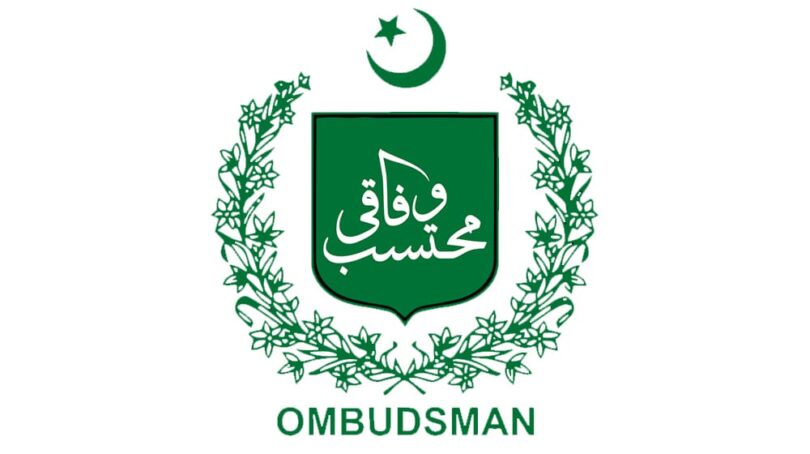Wafaqi Mohtasib (Federal Ombudsman) Ejaz Ahmad Qureshi has directed the investigation officers and the heads of federal agencies to ensure timely implementation of Wafaqi Mohtasib’s decisions since no slackness would be tolerated on this count. According to him, the Federal Ombudsman has so far decided about 178000 complaints since January, and the number of complaints likely touch an all-time high figure of 190000 by the year-end. The National Ombudsman noted that his office is a poor man’s court and its main purpose was to redress the grievances of oppressed and marginalized members of the community. All out efforts would be undertaken by the government officials to resolve the complaints so that relief was provided to poor strata. According to him, the officers of Wafaqi Mohtasib had put in their best to reach out to the public to resolve their complaints through Khulli Katchehries and Informal Resolution of Disputes (IRD), without the allocation of additional budget and manpower.
Founded in 1983, the Federal Ombudsman Office is the least known and poorly performed institution of the State of Pakistan. Historically, the awareness about the role and task of the Ombudsman Office and accessibility to the office remained limited in a majority of areas, affecting its outreach and ability to address public grievances and play its role effectively. Meanwhile, insufficient infrastructure, limited authority, and no cooperation from the sister agencies and other government departments remained major hurdles in the service delivery of the Ombudsman secretariat throughout the past. Owing to these circumstances, the office became a ceremonial and flashy setup, while delay or failure in readdressing public complaints led to a massive backlog and ill-repute of the institution. Meanwhile, the modus operandi and working style of the federal Ombudsman office include holding Khulli katchehries and Informal Resolution of Disputes (IRD) which means mediating talks/ agreement between petitioner and accused to settle their mutual issue. Plea bargains or IRDs do not substitute justice for the victim rather it is like trading of justice and facilitation of a give and take deal between victim and criminals. Historically, such informal methods of dispute resolution should not and must not be encouraged by the state institutions particularly courts and adjudicators, that meant for justice delivery and service to the public. In fact, a plea bargain or IRD is a failure of the system, during which a victim joins hands with the oppressor in a state of duress, compulsion, and disappointment from the laid down mechanism and state institutions.
Unfortunately, Pakistan’s state institutions and public offices including basic utility providers, the Police, the FIA, the Anti-Corruption Establishment, the Federal and Provincial Ombudsman Offices, the Judiciary, and local governments often publish fake data and bogus statistics regarding their performance and achievements, whereas all institutions failed in providing relief to the public in their respective domains and current day modern technology is being used by them for shedding off their workload and elude their responsibility instead of using those blessings to enhance their professionalism and improve their service to the public. Unfortunately, online portals, cell phone messaging, cameras and computers, Khuli Ketcheries, and the latest innovations could not benefit the public, as those innovations are being used by government departments for bookwork to avoid accountability. Meanwhile, those modern technologies and sane mechanisms do not operate mechanically but are being handled by corrupt government officials, who do not owe a kind heart or a sagacious mind to use their position in service to humanity and their countrymen.
The Chief Ombudsman should re-evaluate the data provided by his juniors as the public is very disappointed with the so-called poor man’s court which is practically a poor court, with limited authority, an understaffed and poorly managed institution. There is a dire need for stringent reforms within the Ombudsman setup, together with induction, and training of manpower, work methodology, case management, and strict implementation of recommendations along with robust outreach to the public to ensure broader accessibility and awareness among the masses. So, the idea of an Ombudsman could work in true letter and spirit and play an effective role in mitigation of public grievances and improve service delivery of the government institutions in the country.







